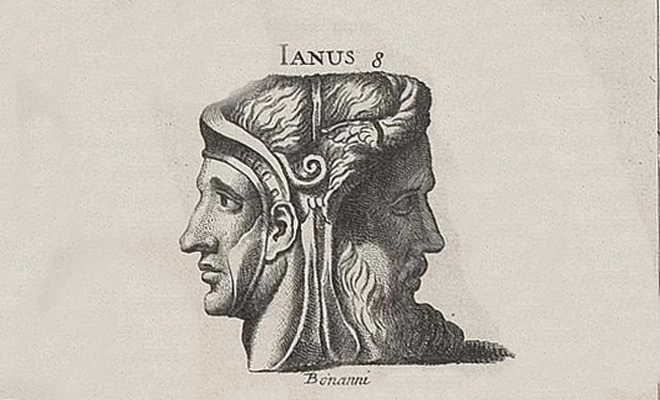Another devious plot of the devil revolves around convincing us that we can live two lives. He thoroughly enjoys the thought of us living our daily lives divorced from our Faith, but still approaching the altar on Sunday to receive the Eucharist.
[featured-image single_newwindow=”false”]
One could say that the devil encourages us to be neither hot nor cold, but lukewarm.
Screwtape frames the scenario like this:
[The Patient] can be made to take a positive pleasure in the perception that the two sides of his life are inconsistent. This is done by exploiting his vanity. He can be taught to enjoy kneeling beside the grocer on Sunday just because he remembers that the grocer could not possibly understand the urbane and mocking world which he inhabited on Saturday evening; and contrariwise, to enjoy the bawdy and blasphemy over the coffee with these admirable friends all the more because he is aware of a ‘deeper,’ ‘spiritual’ world within him which they cannot understand. You see the idea–the worldly friends touch him on one side and the grocer on the other, and he is the complete, balanced, complex man who sees round them all. Thus, while being permanently treacherous to at least two sets of people, he will feel, instead of shame, a continual undercurrent of self-satisfaction. (51-52)
As you can see, the Patient is a man of two worlds and he is being taught to enjoy that fact. Instead of choosing to live a life of total debauchery, the devil is trying to convince him that he can live two parallel lives with no consequences. The devil even tries to say that this type of double life is preferable and something to be desired.
Unfortunately, this type of life is all too common. Many of us go to Mass on Sunday, but live a totally different life during the week. A person could look at our daily life and not realize we are a Christian. They might even think otherwise and be surprised to know that we go to Church on Sundays.
This is not what we are commissioned to do after every Mass.
The priest or deacon says at the end of Mass: “Go in peace, glorifying the Lord by your life.” This particular Mass dismissal was handpicked by Pope Benedict XVI and was deliberately chosen to show the continuity we should have in our life. Instead of the end of Mass being like the end of a theater production, it is a sending forth; it is a beginning. As Pope Benedict reflected on in Sacramentum Caritatis:
After the blessing, the deacon or the priest dismisses the people with the words: Ite, missa est. These words help us to grasp the relationship between the Mass just celebrated and the mission of Christians in the world. In antiquity, missa simply meant “dismissal”. However in Christian usage it gradually took on a deeper meaning. The word “dismissal” has come to imply a “mission”. These few words succinctly express the missionary nature of the Church. The People of God might be helped to understand more clearly this essential dimension of the Church’s life, taking the dismissal as a starting-point. (§ 51, emphasis added)
At the end of every Mass we are literally commissioned; sent forth on a mission. It is our God-given duty to take Christ to the workplace and even to social gatherings and parties. People should know that we are Christian.
This does not mean that we should begin every conversation with, “do you know that Jesus died on the cross for you?” In the right context, yes, that should be said. However, we are called to live out our Christian life in both words and deeds. Our co-workers, friends, and family should be able to know without even asking that we are Christian.
To conclude, here is another way to put it:
The beauty of Christian witness expresses the beauty of Christianity and provides for its future. How can we be credible in announcing the “good news” if our lives are unable to manifest the “beauty” of this life? From the meeting of faith with Christ, springs forth, in an interior dynamic action supported by Grace, the holiness of the disciples and their capacity to make “beautiful and good” their common life and that of their neighbours. It is not exterior beauty and superficiality, a façade, but an interior beauty that is painted under the action of the Holy Spirit. It shines before men: nothing can hide that which is an essential part of its being. (The Via Pulchritudinis, III.3, emphasis added)
Takeaway point #9: Do not live a “double life.” Live every minute as a Christian.
Read the Entire Series
- The Enemy’s Tactic #8: How the Devil Twists Pleasure into a Stumbling Block for Many
- The Enemy’s Tactic #7: How the Devil Hides his Existence with Red Tights and a Pitchfork
- The Enemy’s Tactic #6: How Satan Encourages us to be Charitable to People we Do Not Know
- The Enemy’s Tactic #5: How the Devil Tricks us into Believing that Death Will Never Come
- The Enemy’s Tactic #4: Stripping the Liturgy
- The Enemy’s Tactic #3: Daily Pinpricks
- The Enemy’s Tactic #2: Focusing on Sinners in the Church
- The Enemy’s Tactic #1: The Loss of Reason
- In the Enemy’s Camp: An In-depth Look at the Tactics of the Devil
————-
***If you would like to follow-along reading the The Screwtape Letters, I suggest to purchase your own copy of C.S. Lewis’ The Screwtape Letters. If you don’t like reading, I highly suggest buying the dramatization of the letters by Focus on the Family, called The Screwtape Letters: First Ever Full-cast Dramatization of the Diabolical Classic (Radio Theatre)
. It features Andy Serkis, who played Gollum in The Lord of the Rings and The Hobbit and is well produced.

